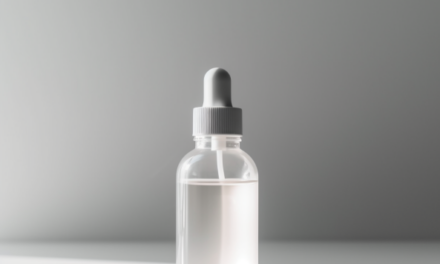Can You Use Retinoids for Rosacea-Prone Skin?
If you’ve been grappling with the frustrating skin condition called rosacea, you may have been advised to steer clear of retinoids. This advice typically stems from concerns that retinoids can further irritate your already inflamed skin. But here’s something that may surprise you: retinoids, in fact, are commonly used in rosacea medical treatments.

Let’s first delve a little deeper into what rosacea really is. It’s a skin disorder that triggers inflammation and redness, and can cause alterations to the blood vessels in your skin. What’s more, different types of rosacea present in different ways. Rosacea can also lead to the degradation of elastin and collagen, critical components in maintaining our skin’s elasticity and health, ultimately resulting in wrinkles.
So, how do retinoids fit into the picture? Well, both topical and oral retinoids have proven to be beneficial in managing rosacea. Their mechanism involves promoting the remodeling of the connective tissue in your skin and reducing inflammation.
However, it’s important to note that the positive effects of retinoids on rosacea are not immediate. It could be several months before you begin noticing a difference. But don’t let this deter you. Studies have consistently demonstrated their effectiveness, making retinoids a valuable consideration for those seeking long-term relief from rosacea symptoms.
Naturally, the thought of potential side effects might give you pause. Some individuals do experience irritation with retinoid use, and there are concerns that these substances might stimulate blood vessel growth in the skin. However, research provides reassurance. While retinoids might cause some irritation, they don’t appear to accelerate the growth of blood vessels. In fact, retinoids possess anti-angiogenic properties, which means they might actually prevent abnormal new blood vessel growth.
If you’re considering using a retinoid for your rosacea, retinal at concentrations of about 0.05% could be a suitable choice due to its lower irritation potential. To avoid any unnecessary irritation, introduce retinoid slowly into your routine, perhaps once or twice a week initially. If your skin responds well, you can gradually increase usage up to daily.
In conclusion, retinoids, particularly retinal, can be helpful for those struggling with rosacea. However, it’s crucial to keep in mind that their effects can take some time to manifest and may cause some irritation. Before considering the use of retinoids, it’s always safer and smarter to consult with a dermatologist. They will be able to guide you on the best course of action tailored to your unique skin situation.
Choose your products based on what's inside
WIMJ Search allows you to select skincare products based on ingredients, not marketing hype. Filter products by actives included, and exclude ingredients you don’t want. Check the concentration of ingredients and potential irritants.
Sources
-
Swiss S1 guideline for the treatment of rosacea https://onlinelibrary.wiley.com/doi/full/10.1111/jdv.14349
-
Retinaldehyde Alleviates Rosacea https://www.karger.com/Article/Abstract/51380
-
Rosacea Management https://www.karger.com/Article/FullText/446215
Related Articles
Winter Skin Care: Navigating the Chilly Season with Healthy Skin
Let’s dive into understanding winter skin and how to best care for it.
The Dark Side of Lightweight Sunscreens
Do lightweight sunscreens provide enough sun protection? Lightweight sunscreen formulas have a higher risk of not providing the sun protection they promise. Learn more in this article.
Azelaic Acid: How It Works and Why You Might Need It In Your Skincare
Azelaic acid may not be the most hyped skincare ingredient, but, frankly speaking, it deserves way more recognition. Despite its underappreciated status, azelaic acid boasts a myriad of evidence-backed benefits, including combating acne, mitigating rosacea, addressing hyperpigmentation, and fighting against free radicals.
Why Has My Skin Become Sensitive All of a Sudden?
Have you recently noticed your skin turning into a battleground of reactions? Is your once-placid complexion now flaring up at your go-to beauty products? You’re not alone. Suddenly sensitive skin can perplex anyone. Here’s a breakdown of why it might be happening and what you can do about it.
Sunflower Seed Oil: The Top Face Oil For Skin Barrier
Struggling to decide which face oil to choose? Sunflower seed oil might not be the most glamorous or exotic of skincare oils, but it could actually be the best for your skin.
CBD Skincare Benefits and Unknowns
Discover the impressive potential of CBD in skincare and learn about the risks. Our evidence-based exploration covers the CBD potential for treating acne, eczema, psoriasis and combating inflammation.
Is Petrolatum In Skincare Bad?
Get the facts about petrolatum, a top ingredient in skincare. Learn how this powerful moisturizer soothes, protects, and hydrates the skin. Plus, discover why it’s trending on social media and how it’s safe even for the most sensitive skin areas.
Sensitive & Reactive Skin: What to Avoid?
If you have sensitive or reactive skin, what not to do is at least as important as what you actively undertake in terms of skincare. Learn what ingredients and skincare practices to avoid to reduce your skin sensitivity issues and help heal your skin barrier.
Opting for Fragrance-Free Skincare: A Skin-Friendly Choice
Opting for Fragrance-Free Skincare: A Skin-Friendly ChoiceIs the smell of your skincare products hurting your skin? It's a question we often don't think about. Yes, the scents can be nice, but they can also cause problems. About one in three skin issues from cosmetics...
What Does Sensitive Skin Mean and How to Help It?
Discover what sensitive skin truly means. We break down the causes, symptoms, and potential triggers of sensitive skin, and share simple steps to manage and reduce skin sensitivity effectively.




